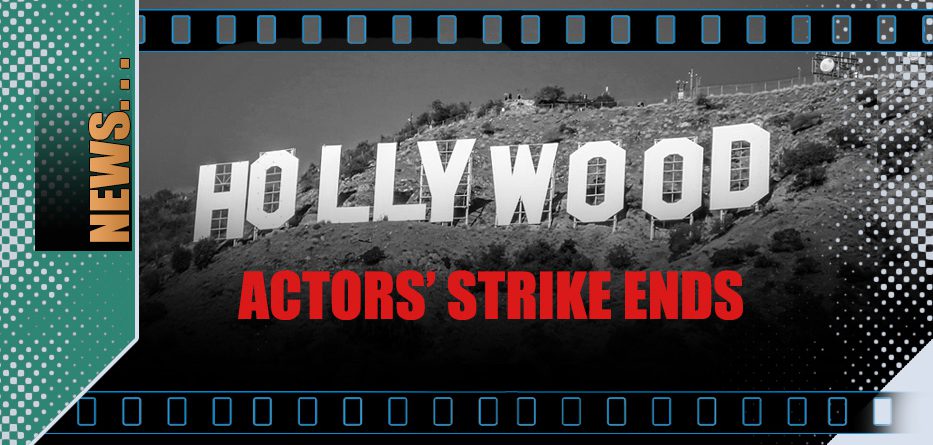As the historic actors’ strike ends, it’s a case of ‘How we got here, how it’s going…’
It’s officially been 118 days – 2nd May – since the actors’ union SAG-AFTRA announced that its members were on strike. The combination of the WGA strike ands the actors’ strike essentially brought over 90% of work on television and film to a standstill. Television shows stopped writing and filming and proposed future projects were put on hold, some even cancelled.
There had been rumblings it would happen and so, though it was no surprise, the controversies began. The issues at the heart of the disagreement were both expansive and serious. At the time the strike action began, the WGA‘s negotiating committee co-chair Chris Keyser said: “We have reached this moment today not of our own choosing but because the companies’ assault on writer income and working conditions have pushed us to an existential brink…”
Studios pushed back saying they were already paying what they could afford, but it was impossible to deny that wider issues were also very much in play, such as AI (Artificial Intelligence – becoming prevalent in buy-in writing processes was getting more commercial, writers’ rooms were often getting down-sized and the profits being made through new platforms and markets were not filtering down, often due to unclear or opportunistic accounting. (For instance Netflix infamously keeps its viewing-figures secret and Daredevil show-runner Steven DeKnight noted that while he wished the upcoming Disney+ show Daredevil: Born Again series the very best, the slight changes or tweaks to series titles were all too often used to reset default payments that would be more if the series remained an ongoing series with a consistent title).
In July, the strikers were joined by members of the SAG (Screen Actors’ Guild) who had postponed any possible strike-action of their own to give the studios more time to consider some sort of agreement. However the second deadline passed on 13th July and picketing began the next day, the SAG‘s 160,000 members overwhelmingly voting to support a strike. The SAG union shared some of the basic complaints (and then picket-line support) talking about the guard-rails regarding performance-capture, reciprocals and – again – out-of-date methods of renumerations.
Famous faces from current and classic shows appeared on picket-lines. (As an example, as far back as 1999, The X-Files star David Duchovny had famously filed a lawsuit during his tenure as Fox Mulder claiming that the syndication deal reached between FOX and FX – technically different arms of the same company – had been a ‘secret sweetheart’ deal at a knowingly devalued price that cheated him out of potential royalties – the lawsuit was settled out of court in 2000). Since then, the issue has not got any clearer. The modern format or shorter seasons on platforms such as Netflix and Hulu have also meant that actors and writers are getting paid less.
The negotiations continued, with some citing bad faith. Actor Sean Astin (The Lord of the Rings, Stranger Things) was part of the negotiating committee and said he was amazed by the fact that the AMPTP (Alliance of Motion Picture and Television Producers) brought very little to the table, even after the extension and that there was a feeling of bad faith. He told the Hollywood Reporter that: “Our AI proposal that we sent over was a product of great effort on behalf of experts that are volunteers, are members. We all are struggling to figure out how we’re going to deal with this new technology. And we pushed it across in good faith, and they came back with bubpkis. They did not want to seriously talk about the fact that AI-generated characters or performances can displace actors, and stunt people, and background.”
For their part, the AMPTP disagreed and said that they “…presented a deal that offered historic pay and residual increases, substantially higher caps on pension and health contributions, audition protections, shortened series option periods, and a groundbreaking AI proposal which protects performers’ digital likenesses, including a requirement for performer’s consent for the creation and use of digital replicas or for digital alterations of a performance…”
That last part raised a few eyebrows with some asking why actor’s consent wasn’t already a prerequisite in those matters? Somewhat alarmingly, acclaimed actor/singer Lena Hall, who filmed the final season of Snowpiercer last year (before the series was pushed off the schedules by corporate tax schemes – but that’s a different profits issue!) noted that all the show’s main cast had undergone body-scanning which they were told at the time was just to help with visual effects, but that now – with the studio’s comments – there was a lack of clarity about the rights to those. Apparently, day-players could be offered a full day’s wage for being scanned for background placement but that they too would lose any rights or further payment however the studios chose to use those avatars later. SAG said this was intolerable and clearly a threat to the acting profession and want further clarity on its use and implications going forward.
Duncan Crabtree-Ireland, SAG‘s chief negotiator disagreed that the studio proposals were groundbreaking. Citing the scanning rights issue and offer he noted: “If you think that’s a groundbreaking proposal, I suggest you think again…”
To a large extent, most actors, writers, producers and directors were in lock-step… at the very least, a massive majority were actively supportive. Some productions were granted waivers to continue production working on SAG-acceptable policies – though even this proved controversial. Ryan Murphy’s American Horror Story. continued to shoot with Murphy claiming that while he continued to be on-set, he would be abiding my WGA rules not to write anything – but some other showrunners were vocal in their disapproval of that stance.
There were other exceptions to the largely unified support. A video showing Arrow star Stephen Amell talking at GalaxyCon in late July seemed to show him breaking ranks saying he supported the union but found the idea of striking ‘myopic’ and ‘reductive’. These contradictory words and the fact that he seemed to be openly promoting the upcoming season of his latest show Heels, did not go down well with fellow actors who instantly condemned his position. Amell, perhaps sensing the mood, issued a more lengthy statement on Tuesday 1st August in which he said he’d been ‘inarticulate’ and misinterpreted and attempted to explain he hadn’t meant to say what the video showed. Kevin Sorbo, once famous as Hercules, also appeared to be dismissive of SAG President Fran Drescher’s rallying calls at the start of the strike. Drescher (The Nanny), who had received some criticism for attending a publicity event in France just days ahead of the strike deadline, came out with cannons roaring when the union announced they felt they had to go on strike and has been a popular face of the dispute since. Echoing her Nanny character who famously would never cross a picket-line, she said: “If we don’t stand tall right now, we are all going to be in trouble. We are all going to be in jeopardy of being replaced by machines and big business… At some point, the jig is up. You cannot keep being dwindled and marginalized, disrespected and dishonored.” More recently the likes of Drew Barrymore were scorched by her peers for attempting to bring back her chat-show during the strike – she later relented.
Some of the public asked why the strikes are needed at all – with the idea that a lot of Hollywood writers and actors are paid a lot of money already.
The truth is that, wherever you stood on the striking issue, a vast majority of writers and artists are not rich. It’s been pointed out that the A-List actors are only the small tip of a large iceberg and that many actors do not get paid enough to do that as their sole job. Highlighting some of the problems, prominent actor Michelle Hurd (Star Trek: Picard, Dead City etc) noted in a TikTok interview about the strike that though she was in the studio-originated ‘top of show’ category and featured in a number of shows over the last year (earning between $5000-$8000 an episode) even having that prolific doesn’t end up qualifying her for basic health insurance and so it’s still a job-to-job, pay cheque-to-pay cheque scenario. Plenty of jobbing actors don’t even have that exposure and are even further below the line. Jana Schmieding (who plays Bev on the hit show Reservation Dogs) posted on twitter/X explaining that for worldwide streaming of her episodes on Disney/Hulu she recently got a residual cheque for literally $.03 per quarter. Her central role in Rutherford Falls got her a ‘whopping’ $33.15 for the same period. This Us actor Mandy Moore also told the Hollywood Reporter that she “…was talking with my business manager who said he’s received a residual for a penny and two pennies...We’re in incredibly fortunate positions as working actors having been on shows that found tremendous success in one way or another … but many actors in our position for years before us were able to live off of residuals or at least pay their bills…”
Disney boss Bob Iger commented that though he respected the unions’ desire to get the best deals for their members that tv writers and actors are well-paid, though – again – it’s hard to substantiate that with the varying amounts that do get paid. He is quoted as saying that the demands of the unions were “…just not realistic…” and that the strikes will have a “…very, very damaging effect on the whole business…” On the flipside, it has been noted that some show-runners and writers are hired for a very limited time to get things off the ground and then cheaper writers brought in or writers’ room down-sized. It’s also been pointed out that while Bob Iger may think that wages are sufficient for some writers, his recently negotiated 2023 pay-deal resulted in a package valued at around $27 million.
Under strike conditions, the WGA members could not write or be active in providing new material and were not allowed to cross picket-lines. SAG actors were also not supposed to cross picket-lines or work on films/tv. (They could attend any event they want, but not in an official position or officially promoting any of the productions they were currently in). The strike action did not affect UK actors in UK productions, though there are some productions that were affected. The current shooting on Andor‘s second season in the UK was curtailed with only non-SAG actors allowed to work (British actors’ union Equity was not involved in American negotiations and Equity-based contracts would forbid actors from striking in solidarity). However, headlines were made when the cast of Oppenheimer, in London for the premiere on 13th July, were informed of the imminent strike action and made the decision to immediately leave the premiere in solidarity. The situation affected events such as this year’s SDCC (San Diego Comic Con) with a reduced presence from studios – Multimedia panels (particularly in the cavernous Hall H) still took place but – to be fair – the original comics side of the equation thrived without having to compete with the bigger multimedia events that often dominate coverage.
Not knowing how long strikes would continue, the main US networks planned to bolster their new line-ups with alternatives: reality-shows being drafted in to fill gaps. Some shows went straight into filming new episodes ahead of the strike to have material ready (an unspecified number, but considered to be near its 13 episode order, of Quantum Leap second season episodes and some shows will move to earlier in the season and some foreign and previously-streaming shows will appear: including the BBC”s original version of Ghosts and there was a network debut for Ms. Marvel (originally a Disney+ show. The Emmys, with nominations already released, have also been postponed until further notice.
When the WGA strike ended in late September and ratified just over a week later, some thought the SAG-AFTRA strike would also end quickly, but it became clear that a there was still a big chasm between the studios and the actors’ union. Key issues such as AI continued to be major sticking points and both sides started to make it clear that while they wanted a solution they weren’t prepared to give much ground. News came at the start of November that there had been some movement, but even at the start of this week there was still a lot of rhetoric. A ‘final’ deal was offered by the studios who issued a time-constraint for an acceptance or rejection of those terms, but the union noted that they would take all the time needed to scrutinise the small-print, just as the studios had done when the shoe was on the other foot. Pragmatically, the next few days were always going to be important, with many television productions saying that it would be nigh on impossible to get even a fraction of a full season of shows out for early in 2024 if a deal was not agreed this week.
“We didn’t just come toward you, we came all the way to you,” Netflix’s Ted Sarandos claimed on 3rd November as it appeared the chasm was narrowing towards a workable compromise.
Tonight – Wednesday 8th November, SAG-AFTRA formally approved the deal – which will last for three years and see many of the areas of concern addressed and better deals and securities in place – though the exact details have not yet been released. The deal will have to be ratified after the SAG-AFTRA recommendation to accept.











